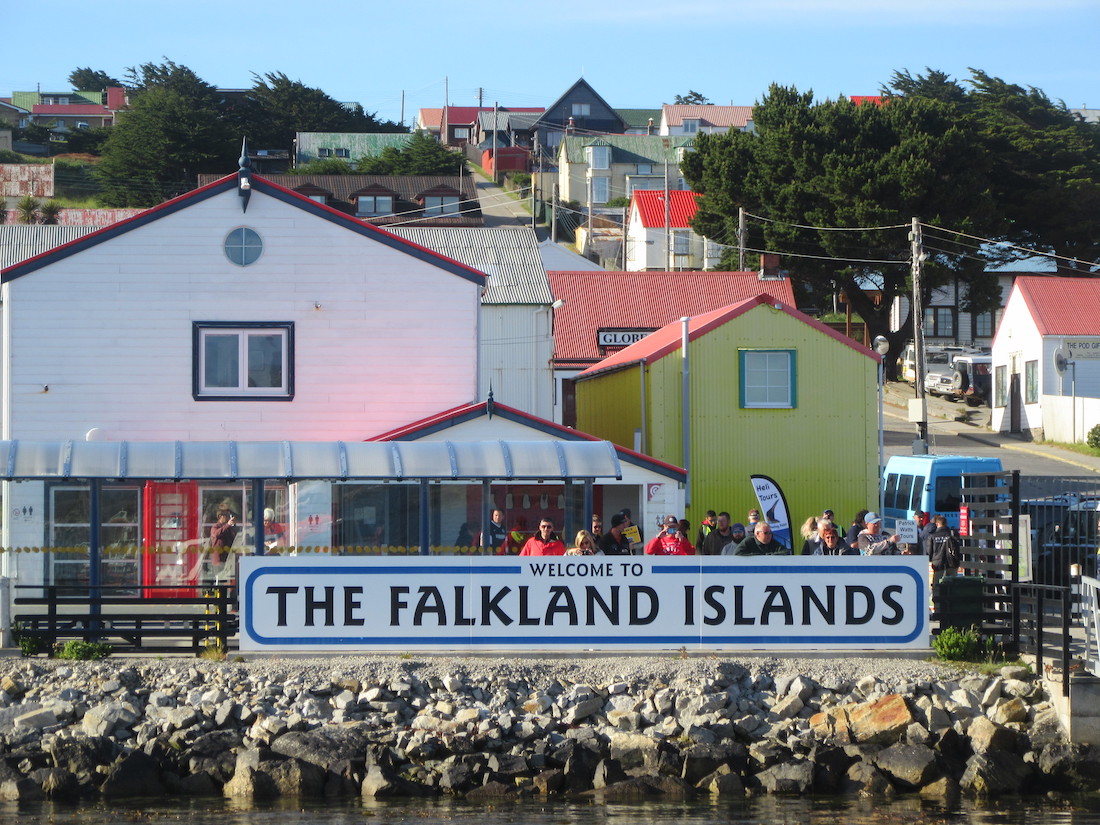In the latest issue of The New Yorker Larissa MacFarquhar has a deeply researched and beautifully written story, “How Prosperity Transformed the Falklands.” It chronicles the history of the Falkland Islands from the early settlement of the then-uninhabited islands to the Falklands War between Argentina and the United Kingdom in 1982, as well as the economic transformation after that conflict. It is an economic success story but also a meditation on what makes a community and nation and how rapid economic transformation has resulted in a crisis of identity in the archipelago at the bottom of the world: “Until recently, the Falkland Islands were a quasi-feudal colony, in which an arcadian Britain of the past was preserved in microcosm – a population of eighteen hundred, territory a little larger than Jamaica.”
The catalyst for the Falklands’ transformation from an archipelago of shepherds to economic dynamo was propelled by the establishment of property rights, particularly fishing rights, in the aftermath of the Falklands War:
Sales of fishing licenses to foreign fleets multiplied the islands’ collective income threefold, virtually overnight.
Suddenly, all sorts of things that people had been longing for were actually possible …
The Falkland Islands were now among the richest places on earth – with an income, per capita, comparable to those of Norway and Qatar.
This newfound wealth provided opportunities for individual prosperity, the development of infrastructure, increasing levels of self-government, and population growth but many who came of age prior to these transformations are ill-at-ease:
“I wish it had never happened,” Patrick Watts says. “I did love the old Falklands the way it was – the nice, relaxed, slow way of life we had – which some people couldn’t tolerate, so they upped and went. It was a small population, and we were closer together. Pre-’82, the Falklands was the place where I lived; now it’s the place where I work. That’s how I describe it.”
The past of recent memory in the Falklands is a past that was pre-commercial, aristocratic, agricultural, and rooted in families and communities. Most in the developed world have always lived simultaneously in two societies which the economist Paul Heyne describes in his brilliant essay, “Are Economists Basically Immoral”:
One is the face-to-face society, like the family, in which we can and should directly pursue one another’s welfare. But we also live in large, necessarily impersonal societies in which we cooperate to our mutual advantage with thousands, even millions, of people whom we usually do not even see, but whose welfare we promote most effectively by diligently pursuing our own welfare. We live predominantly in what Adam Smith called a “commercial society.”
In such a society, a society in which many of our material needs can be met in the marketplace, incentives to participate in a robust way in family and community life are diminished. Prosperity offers a temptation, as well as a promise, as the Lord admonished, “Watch out and guard yourself from all types of greed, because one’s life does not consist in the abundance of his possessions” (St. Luke 12:15). Our needs are greater than any material prosperity can provide, as the Lord makes plan in the parable following that admonition:
The land of a certain rich man produced an abundant crop, so he thought to himself, “What should I do, for I have nowhere to store my crops?” Then he said, “I will do this: I will tear down my barns and build bigger ones, and there I will store all my grain and my goods. And I will say to myself, ‘You have plenty of goods stored up for many years; relax, eat, drink, celebrate!’ But God said to him, “You fool! This very night your life will be demanded back from you, but who will get what you have prepared for yourself?” So it is with the one who stores up riches for himself, but is not rich toward God (St. Luke 12:16-21).
Prosperity and wealth creation are necessary but not sufficient conditions for human flourishing. Faithfulness is maintained on a razor’s edge: “Look! I have set before you today life and prosperity on the one hand, and death and disaster on the other” (Deuteronomy 30:15).
Heyne describes this perilous and necessary balance using the language coined by the economist Kenneth Boulding of “exchange systems” contrasted with “integrative systems”:
Integrative systems work through a meeting of minds, through a convergence of images, values, and aspirations. Participation in integrative social systems can be deeply satisfying, and I think some participation in integrative systems is essential to human health and happiness. But it is a serious mistake to use the features of integrative systems to pass moral judgment on exchange systems.
What Mr. Watts, and undoubtedly many other Falkland Islanders, are uneasy about is the displacement and replacement of integrative systems with exchange systems. This displacement and replacement, however, is not inevitable. The alleviation of poverty and a sustainable way of life in the Falklands requires the exchange systems of the commercial society, as MacFarquhar’s essay makes clear. One immigrant to the Falkland’s profiled in the essay, Shupi Chipunza, provides a model for how to be successful in both the commercial and personal worlds:
[H]e had lived in so many places that he knew what it took to get the natives to accept you. He joined a soccer team, he participated in charity fund-raisers – there were a lot of charity fund-raisers.
The challenges of maintaining vibrant family and community life in an age of prosperity are real, but opportunities for solidarity and service are always at hand: “Ask, and it will be given to you; seek, and you will find; knock, and the door will be opened for you” (St. Matthew 7:7).
(Photo credit: amanderson2. CC BY 2.0.)

